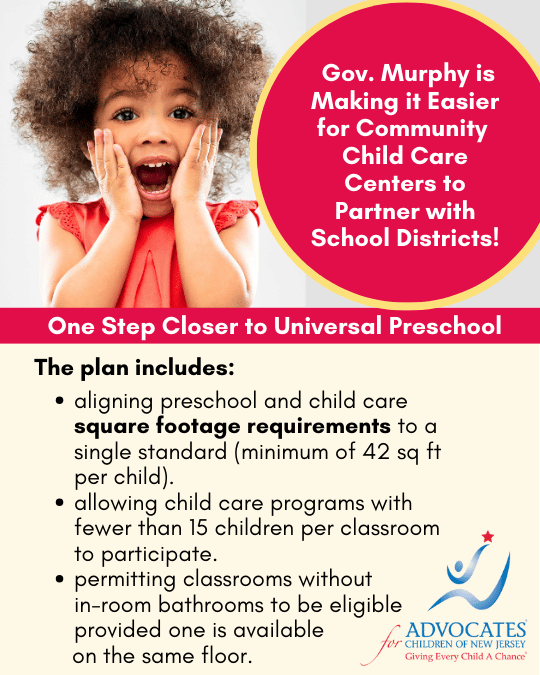Posted on March 10, 2025


TO:
Asw. Shama A. Haider, Chair
Asm. William W. Spearman, Vice Chair
Members of the Assembly Committee on Children, Families and Food Security
FROM: Winifred Smith-Jenkins, Ed.D, Director of Early Learning for Policy and Advocacy
Cindy Shields, Senior Policy Analyst for Early Childhood, Advocates for Children of New Jersey
DATE: March 10, 2025
RE: A2291 (categorical eligibility, expanding child care assistance to all full-time child care workers)
Good morning, Chairwoman Haider and members of the committee. Thank you for the opportunity to speak today in strong support of Assembly Bill 2291.
Child care is not just a service—it is the backbone of our economy. Right now, New Jersey’s child care system is in crisis. Providers are struggling to keep their doors open, child care workers are leaving the field due to poverty wages, and families are trapped on endless waitlists or forced to leave the workforce because they can’t find affordable early care and education. We ask these dedicated professionals to care for and educate our youngest learners, yet we pay them wages so low that many struggle to afford care for their own children. Of the nearly 26,000 child care workers in our state, only 859 currently qualify for child care assistance (a mere 3%). That means thousands of the very people we entrust with our children are forced to make impossible choices—often leaving the field altogether, worsening the workforce shortage.
When child care workers cannot afford child care, the entire economy suffers. Parents rely on child care to work, businesses depend on a stable workforce, and young children thrive when they have consistent, high-quality teachers. But right now, we are failing both our families and our workforce. High turnover in child care centers disrupts children’s learning and development, puts stress on providers, and leaves businesses struggling when employees can’t find stable care. This bill would support child care professionals and incentivize individuals to stay in the field, ensuring recruitment and retention of qualified educators.
A2291 is a common-sense solution that other states—including Kentucky, Washington, Massachusetts, and others—have already embraced. By expanding child care assistance to all full-time child care workers, begin to stabilize this critical workforce, reduce turnover, and strengthen New Jersey’s economy.
Child care is not just a service—it is the foundation of our economy. Fully funding DHS must be our highest priority because without it, our workforce crumbles. Any cuts would be catastrophic, forcing child care providers to shut their doors, driving workers out of the field, and leaving families without the care they need to stay employed. The ripple effects would be felt across every industry in New Jersey. If we are truly committed to supporting working families and building a stronger economy, we must not only protect DHS funding but expand it. Child care workers are essential to keeping our economy running—it’s time we invest in them like our future depends on it, because it does.
I urge you to pass this bill and recognize child care workers for what they are: the backbone of our workforce. Thank you for your time and consideration. Should you have any questions or need additional information, please feel free to reach me at cshields@acnj.org.












